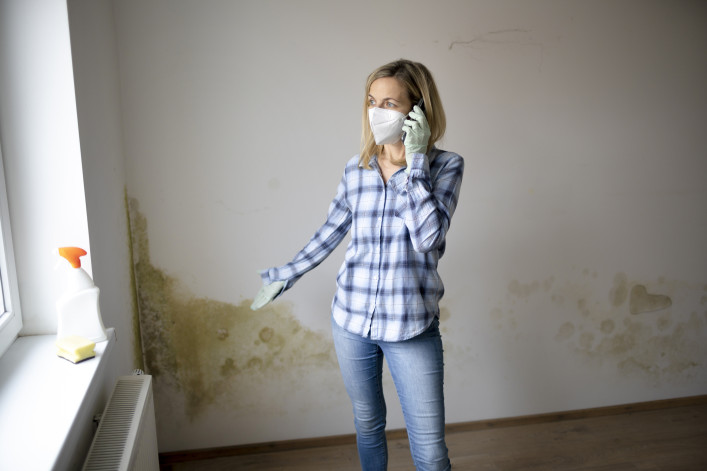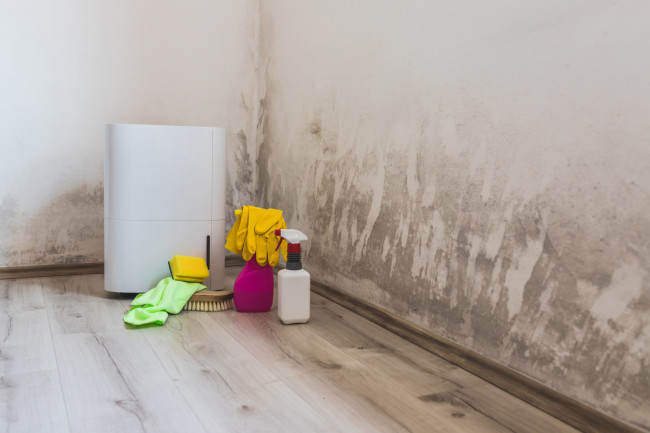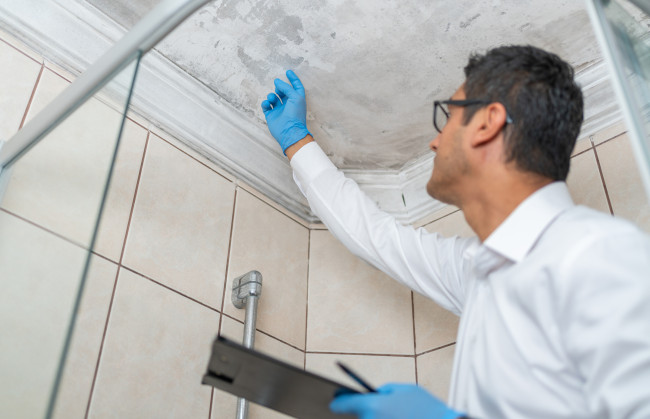How do I force the landlord to remediate my mold-infested apartment?
- Your first step should be to document complaints to your landlord and management company
- You can also file an HP Action in housing court to compel your landlord to address the problem

A mold infestation requires professional cleaning, not just a super and a sponge.
iStock
I am disabled with an immune disorder and live in a rent-stabilized apartment where unsafe levels of mold have been found as result of a building leak. Management refuses to remediate and I can't afford a tenant attorney. What are my options?
There are a few steps you can take to force your landlord to clean up the mold in your apartment—and to make your life more bearable in the meantime.
New York City landlords have an obligation to remediate a mold infestation under Local Law 55, and under Local Law 61, owners of buildings with 10 or more units must hire both a licensed mold assessor and a separate remediator to remove the mold when it exceeds 10 square feet.
Your first step should always be to ask your landlord or management company to fix the issue directly and do it in writing, although from your description, it sounds like they’ve decided to ignore your complaints.
You could also send them a letter in the mail using the nonprofit JustFix’s online tool, which will create a custom letter outlining your mold problem, your landlord’s legal duty to fix it, and the financial penalties they could face if they don’t comply. Even if it doesn’t work, it’s a good way to start accumulating evidence of the problem, said Joel Stillman, JustFix’s co-executive director.
The letter will formalize “the complaint—creating a paper trail of evidence that the issue has been documented and communicated to the landlord/management,” Stillman said. “Many tenants are also able to get their landlord/management to make repairs based on sending the letter, because it shows to the landlord/management that the tenant knows what their rights are and how to assert those rights.”
[Editor's note: Realty Bites tackles your NYC rental questions. Have a query for our experts? Drop us an email. We respect all requests for anonymity.]
1. Report the problem to the HPD
After complaining to your landlord, your next step should be to call 311 or contact the city online to make a complaint to the Department of Housing Preservation and Development (HPD), the agency charged with investigating housing complaints. HPD received more than 31,000 mold complaints in 2023, according to an annual city report.
When you make a complaint, HPD will try to contact your building’s managing agent and encourage them to remediate the mold. If your landlord still doesn’t fix the problem, HPD will send an inspector to check for mold, according to the department.
When an inspector arrives, make sure that you point out exactly where the mold is located, said NYC tenant attorney James Fishman, a partner at Fishman Law Group. Under Local Law 55, inspectors are only required to look at surfaces unobstructed by “furniture or other furnishings,” unless there is “visible evidence” that indicates an “obstructed surface” has mold.
So if your mold is hidden—under your sink, or at the back of your closet for example—point it out to the inspector. If it’s completely invisible to the naked eye, or if you plan to go to court to force your landlord to make repairs (and more on that later), you should hire a mold inspector to test the air for mold, Fishman said.
“I always tell any tenant who contacts me about a mold issue that you have to get a really top notch inspection done by a top notch mold inspector who is unimpeachable,” Fishman said. He recommends Olmsted Environmental Services. Their reports typically cost $1,000 to $1,500, said Edward Olmsted, the company’s president.
Provided the HPD inspector is able to spot your mold problem, they will issue a violation. That violation gives your landlord a limited window to resolve the issue before facing fines ranging from $25 per day to $1,200 per day in larger buildings with severe mold infestations and other maintenance issues, according to HPD.
HPD received more than 31,000 mold complaints in 2023 and completed 25,311 inspections, according to an annual city report. It issued 21,492 violations that same year, mostly in the Bronx, Brooklyn, and northern Manhattan. Most of those violations were Class A violations, which gives the owner 90 days to remediate the issue.
2. Get a rent reduction through the DHCR
Because you live in a rent-stabilized apartment, you can also file for a reduction in your rent through the Division of Housing and Community Renewal by filling out this form (form RA-81).
Securing a lower rent can help you save money to cover other costs—such as an attorney, or hotel stays if you have to leave your apartment because of the danger the mold poses to your health. Mold can cause inflammation in your respiratory system due to the spores mold releases into the air, particularly among those at a higher risk of an infection—such as elderly New Yorkers, Olmsted said.
Unfortunately, a mold infestation requires professional cleaning, Olmsted added. A mold remediator—usually equipped with protective gear and a respirator—needs to seal off the space with plastic sheeting, run a negative air machine into the space to purify the air and contain the spores, and clean the mold carefully. He does not recommend attempting this yourself.
If the infestation gets so bad you’re forced out of your apartment, you could claim that amounted to a constructive eviction, Fishman said. But you’ll have to move out to assert that claim, which will not help if you want to keep the apartment.
3. File an HP action in court
If complaining to HPD and securing a rent reduction doesn’t prod your landlord to act, you can also file an HP action in housing court.
An HP action is a case that you bring against your landlord in housing court to force them to make repairs (or to provide essential services). And you don’t need a lawyer to start one, said Andrea Shapiro, director of programs and advocacy at the Met Council on Housing.
To begin an HP action, you’ll need to go to your county’s HP clerk office to fill out the paperwork and pay a filing fee of $45, though you can appeal to a judge if you can’t afford this fee, according to the New York State Unified Court System. (Make sure you bring the name and address of your landlord, managing agent, or both.)
At housing court, you’ll fill out two forms: the HP action, dubbed an “order to show cause directing the correction of violations” and a petition, named a “verified petition in support of an order to show cause directing the correction of violation,” according to the court system.
The petition will outline what you need repaired, where, and if you want HPD to inspect the conditions again. You’ll also be given an index number, a hearing date, and a date by when you must serve your landlord, managing agent, and HPD your papers (along with instructions on how to do so), according to the court system.
You’ll need to bring a copy of your HP action and petition, as well as any records of mold, to your hearing. Make sure to bring as much evidence as possible, Shapiro said.
“The problem with mold is that sometimes it’s hard to show you have mold,” Shapiro said. “So if you have a city violation, if you got a mold test from a private company, if you have photos,” you should bring all of those documents.
An HP action usually results in the landlord entering a consent order, which requires them to make repairs by a certain time to settle the case. But if they violate that order, it would be beneficial to have a lawyer to file a contempt of court motion against them which can carry sanctions, fines, or even imprisonment in rare cases, Sam Himmelstein, a retired partner at Himmelstein, McConnell, Gribben & Joseph, previously told Brick Underground.
Another benefit of filing an HP action is that your name won’t show up when a tenant screening company tries to find out if you’ve been to housing court before. While it’s illegal to refuse to rent to someone if they appeared in housing court data, also known as the tenant blacklist, that law is difficult to enforce, Fishman said.



























